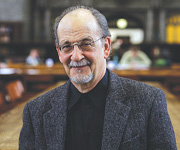Moishe Postone, Professor in History
By William Harmsw-harms@uchicago.edu
News Office
 Moishe Postone |
|
In order to help students articulate their own ideas and approaches that frequently are only implicit in what they say and write, Moishe Postone guides them through an exploration of various theorists’ assumptions and arguments.
“My goal is to increase their sensitivity to the ways understandings of the social world and empirical projects are theoretically framed,” said Postone, Professor in History and a specialist on social theory. Together he and his students discuss attempts to grapple with the nature of modernity, such as the ideas that emerged from a group of German-Jewish thinkers known as the Frankfurt School.
“We discuss the Frankfurt School of critical theory, for instance, and see how those scholars tried to conceptualize massive historical changes in Europe, such as the rise of Nazism, Stalinism and, later, the maturing of a consumer culture,” he said. With a grant from the National Endowment for the Humanities, Postone had studied this group of neo-Marxist thinkers that began to form in the early 1930s at the Institute of Social Research at the University of Frankfurt.
In his advanced graduate colloquium on social and historical theory, Postone aims to deepen students’ understanding of how theory can shape the study of history and how history can shape theory. In analyzing the assumptions and theoretical frameworks with which various theorists attempted to explain the social and historical world, Postone’s students also can become more aware of their own assumptions and approaches.
“I draw students from across the Social Sciences, ranging from history, political science, anthropology and sociology, through the Committee on Social Thought and Comparative Human Development. Because of their disparate backgrounds, students have to learn to discuss issues in ways that are not restricted to the languages of their own disciplines,” Postone said. The resulting conversations add to the richness of the class.
“I learn a great deal from my students,” he added. “They not only are very serious intellectually and thoughtful, but also bring to the table their own perspectives and ideas from the literatures they have read,” said Postone, who also shares his work as a theorist. “I want them to also be aware of my perspective and the assumptions that inform my work.”
The colloquium, like the preparation of a dissertation, requires students to focus serious attention and critical reasoning on selecting a topic to elaborate in a paper.
“I want them to make explicit to themselves the problem they are pursuing,” Postone said. Sometimes an original idea for a dissertation topic emerges as something of a hunch, a non-fully articulated notion of a problem that a student wants to pursue. Through writing draft proposals and feedback from Postone, students often are able to clarify the problem that interests them, to find their own voice.
“I remind them that doing a dissertation will involve a serious commitment of time and energy and define them intellectually, as well as their careers for years. What they do has to be meaningful to them. They can’t just choose a random topic or surf an intellectual wave, but they have to learn to wrestle with the material, to work up a topic in ways that open up new, broader questions.
“Some of the students with whom I’ve worked have done remarkable, path-breaking work. When I see them take off like that, it is deeply satisfying,” he said.
![[Chronicle]](/images/sidebar_header_oct06.gif)